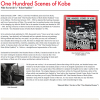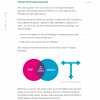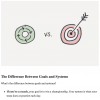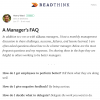
I've seen this in others, and probably in myself as well. I'm not a psychiatrist, or anybody qualified to share medical opinions, but I'm not convinced depression is a chemically-induced situation in all cases. This article is good to keep in mind for me and others. It'd probably be interesting to read his book. #

Maybe it's because he's somebody I feel like I know (thanks to his movies), but I really enjoyed the candor and approach to sharing that Jim shows. I've never felt very artistic, but I'm continually drawn to try something. Regardless, I think the six minutes needed to watch this are well spent. #

I've been working in Python 2 for a couple years at this point, and due to various issues I continued to come across, repeatedly found myself referenced to this article. I should have read it earlier. If you're a software developer, or a wannabe, or anywhere in between, it's time to buck up, and read this. Don't wait like I did. It's worth your 10 minutes. #

Worth reading every word of this article. A fascinating and sad view into something I was completely oblivious to. I'm so glad I read this. #

I really like these paintings by Hide Kawanishi. Takayuki Kita went through the pains of visiting each of the sites, and taking photos from each place, to see what they look like now. Hide's style feels both classic, and new all at the same time. It's worth looking at each painting. There is so much I like, but here are a few call-outs: the framing of #77, the subtle reflection in #48, the perspective and story of #52, the colors of #98. I could keep going. Really, he seemed to show a great attention to detail - both on what to include and exclude.
I wish the page was better, so you could see thumbnails of all the paintings... but at least we get to see them. #

Last year we had a Nacho Libre-themed birthday party for our oldest. We printed these masks twice - once on baby blue paper, and another time on red. With a bit of work with an x-acto knife, we had made great decorations for the goodie bags. Now I can finally close this tab that's been open for so long. #

Charlie Munger, Warren Buffet's business partner of over 40 years, takes an intentional wide and deep approach to learning, which has obviously been highly (financially) beneficial. A couple highlights from the article:
Bill Gates has said of Munger, “He is truly the broadest thinker I have ever encountered. From business principles to economic principles to the design of student dormitories to the design of a catamaran he has no equal… Our longest correspondence was a detailed discussion on the mating habits of naked mole rats and what the human species might learn from them.” Munger has, in short, been the ultimate expert-generalist.
He gives a basic definition of what an Expert Generalist is as:
“Someone who has the ability and curiosity to master and collect expertise in many different disciplines, industries, skills, capabilities, countries, and topics., etc. He or she can then, without necessarily even realizing it, but often by design:
- Draw on that palette of diverse knowledge to recognize patterns and connect the dots across multiple areas.
- Drill deep to focus and perfect the thinking.”
I admired a friend in high school, because it seemed that he could have conversations about all sorts of things with all sorts of people. Munger's style reminds me of him. I really like the intentional approach to this style of learning, and would claim to be trying a version this approach, personally. The full article is certainly worth reading, despite the (real) click-bait title. #

I had never heard of Eyvind Earle until the other day, but I really like his style. Great work on his shadows, and a simple approach that still conveys realism. I think this piece (called Path in Snow)w, in particular, is gorgeous. So perfect. #

I frustrate my direct supervisor at work, in part because I hate goals, and I verbalize my disapproval of them. My nuanced feelings about goals and the deadlines frequently associated with them can't fit into an entry like this. That said, I agree with a lot of what James Clear has to say about goals. One of those that has bitten our team most recently is this shortcoming of goals:
You can’t predict the future. (I know, shocking.)
But every time we set a goal, we try to do it. We try to plan out where we will be and when we will make it there. We try to predict how quickly we can make progress, even though we have no idea what circumstances or situations will arise along the way.
Really though, you should read the whole article. It's well-written, and I'm curious to read his newsletters going forward. #

Henry Ward has some interesting responses to some of these questions, and not all of them do I agree with. Regardless, I most liked the non-abbreviated answers he gave to the following questions:
- How do I get employees to perform better?
- How do I give negative feedback?
- When do I fire somebody?
- Why can’t I just tell people what to do?
SPOILER ALERT! Here are the abbreviated answers he gives to those questions:
- Tell them what they are doing well.
- By being curious.
- When you know they can’t succeed.
- Because the more responsibility you have, the less authority you have. #









